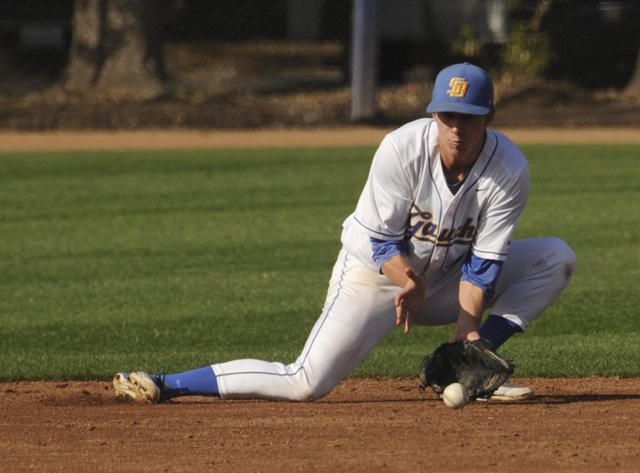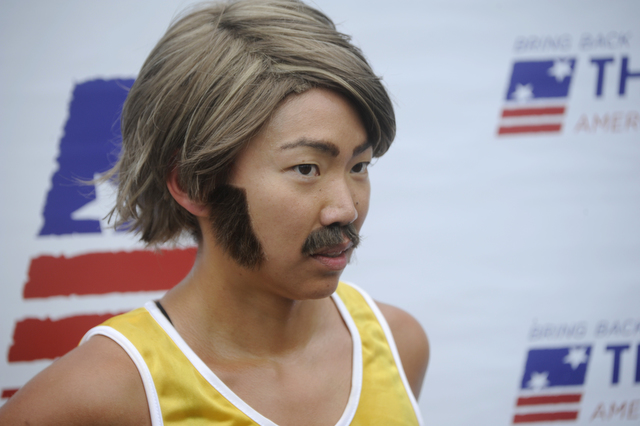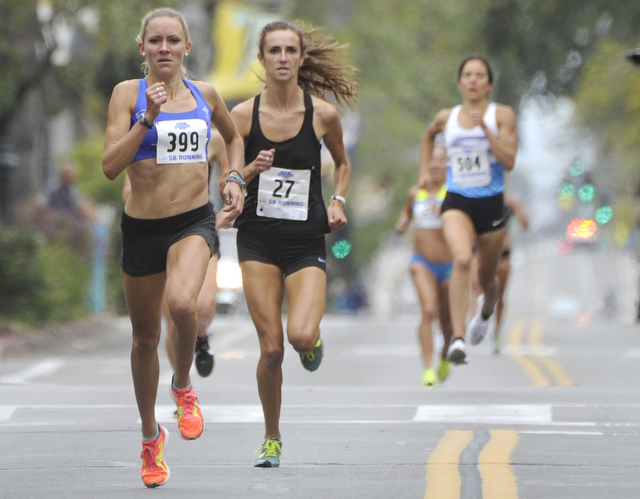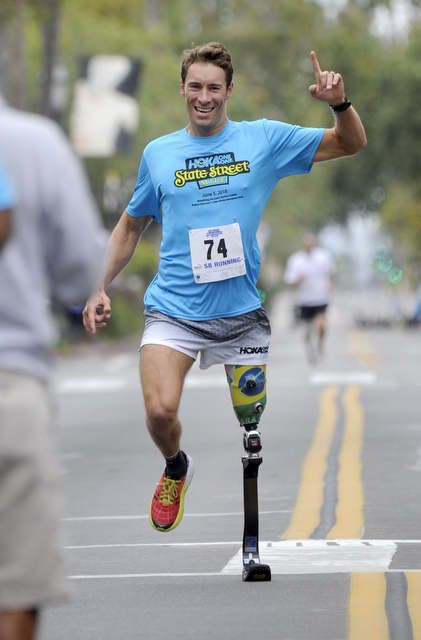Gaucho Baseball Reaches Super Regionals
UCSB Plays Louisville in Sweet 16; Plus Remembering Muhammad Ali and State Street Milers

The mild-mannered UCSB Gauchos looked like Supermen in the final baseball game of the NCAA’s Nashville Regional. They pounded Xavier by a score of 14-5 and earned themselves a ticket to the Super Regionals for the first time. They will play a best-of-three series hosted by the Louisville Cardinals this weekend, and the winner will join seven others at the College World Series in Omaha starting June 18.
The opener of the Louisville series will be televised by ESPN2 at 9 a.m. on Saturday, June 11. The second game, at 9 a.m. on Sunday, will appear on ESPN2 or ESPNU. The third game, if necessary, will be played Monday, with time and carrier to be announced.
More typical of the Gauchos this year were the scores of their other two games in Nashville. They edged Washington, 3-2, on Austin Bush’s home run leading off the bottom of the 14th inning, and they held off Xavier, 5-4 — forcing the Musketeers to play an extra game before the championship rematch.
Nineteen times this season, the Gauchos have gone down to the wire in games decided by one run. Their record in those nail-biters: 16-3. That indicates a team of a certain gritty character, one that comes through with no-surrender pitching, unshakable defense, and clutch hitting.
They trailed Washington 2-1 heading into the bottom of the 12th inning Friday, when Devon Gradford socked his first home run of the season to tie it up. Two innings later, Bush’s game winner was the first of three round-trippers he hit in the regional, earning the big first baseman MVP honors.
Relief pitcher Justin Kelly saved the first win over Xavier when he struck out seven of the Musketeers’ last eight batters. Bush and Clay Fisher, known for his spectacular glove-work at shortstop, both launched three-run homers during the clinching victory Monday, as UCSB matched its highest-scoring output of the season.
The Gauchos did not have to deal with Vanderbilt, the favored host of the regional. The Commodores, stunned by the drowning death of freshman pitching prospect Donny Everett on the eve of the tournament, went 0-2 against Xavier and Washington.
Winning the regional was special enough for the Gauchos to dump a bucketful of Gatorade on their coach, Andrew Checketts. Odds are the ritual won’t be repeated this weekend. Louisville (52-12), the NCAA’s overall No. 2 seed, will be heavily favored over UCSB (40-18-1). The Cardinals are 33-1 on their home field, Jim Patterson Stadium. They went to Omaha in 2013 and 2014 but missed out last year and are aiming to return. Against a pitching staff that allows fewer than three runs a game, the Gauchos hope to keep the games close and conjure their one-run magic.
Louisville will be the site of a rather more illustrious event this week — the memorial for Muhammad Ali, whose hometown once shunned him but has long since embraced him.
THE GREATEST: On February 25, 1964, esteemed rocket scientist William Pickering, director of the Jet Propulsion Laboratory, delivered a lecture to academic high achievers at a nearby high school. As he described the profound possibilities of space exploration, a cheer broke out from a cluster of boys. Pickering smiled proudly, but it was not his speech that drew the enthusiastic response. My friend had a radio hidden under the table, and he whispered to us that the brash young fighter Cassius Clay, who would shortly change his name to Muhammad Ali, had just upset Sonny Liston for the world heavyweight championship.
Ali captured our imagination that night. He became a hero for our generation, a dazzlingly great competitor inside the ring — the sport was still very popular then — and a great communicator outside, where hostilities were no less evident. As he belatedly outgrew the need, and the ability, to make a living with his fists, Ali tapped into his deepest human potential, reaching out with love to people all over this earth.

THE MILERS: Lynna Choy had the look down pat — the straight hair, the round face, the mustache, the yellow Oregon tank top and green shorts, and the fire in her eyes when she ran. It was the look of Steve Prefontaine, who projected Ali-like bravado in the sport of track-and-field. He never had the chance to ease up, as a 1975 car crash took his life at age 24. “I looked him up on the Internet, and he was amazing,” said Choy, a 39-year-old anesthesiologist from San Diego. She costumed herself like “Pre” last Halloween before doing the New York Marathon. She memorized a quote that has been attributed (some say wrongly) to Prefontaine: “The best pace is a suicide pace, and today is a good day to die.”
Choy was one of more than 1,000 runners last Sunday in the 17th Hoka One One State Street Mile, a race that most of them, like her, did for fun. In cool, marine-influenced conditions, they enjoyed the downhill slant of Santa Barbara’s central road from Pedregosa Street to the finish line near De la Guerra Street, where onlookers cheered their efforts.

UCSB runners Thomas Poston and Tori Tsolis gave themselves graduation presents. Poston surged in the last 100 meters to win the men’s elite mile in 3 minutes, 53 seconds, taking home the top prize of $1,000. “I got lifted by the crowd,” Poston said. “It was magical.” The money is nice, he said, “but winning State Street is more important.” Runner-up Scott Bauhs of San Luis Obispo finished in the same time, and UCSB assistant track coach Darius Terry was close behind in 3:54. Poston, a philosophy major, will receive his diploma this weekend.
Tsolis, who set a new UCSB 1,500-meter record while earning her master’s in economics, came close to making it a Gaucho sweep. She finished second to Alycia Cridebring of Davis in a historic women’s elite race. Cridebring’s winning time of 4:23 was a new record, shattering the old mark by 10 seconds. She earned a $1,000 bonus for a total of $2,000. Tsolis collected $750 as runner-up in 4:24. The next two finishers, Kristen Findley and Tracee van der Wyk, also ran faster than the old record in 4:29.

Gilberto Alavez, 56, lost his leg in a car crash in 1992. Three years later, he started running with a prosthetic. The Venice Beach resident won the inaugural Nobbe Amputee Mile in 5:42. “I follow my heart,” he said. Runner-up Andre Barbieri (6:33), a native of Brazil who came to California for the surfing, lost his leg in a snowboarding accident five years ago. He is trying to qualify for the triathlon in the upcoming Paralympics in Rio de Janeiro.
The most popular divisions of the State Street Mile were the family run, with hundreds of participants, and the Platinum Performance Dog Mile. For the second time, the latter produced an unofficial world record, as Brian Duff and Kaydom (a weimaraner) romped down the street in 4:13.
Reed Kotalik of Woodlands, Texas, was a happy kid after finishing in 7:03. He was not only the fastest 6-year-old, but he was also the fastest runner with cerebral palsy. Shortly after the condition was diagnosed in 2014, he told his mother he wanted to run. Dawn Kotalik entered him in a Thanksgiving run that year, and since then he has been invited to races all over the country. The apparel company rabbit sponsored his appearance in Santa Barbara.



